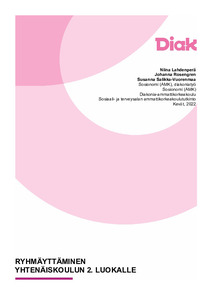Ryhmäyttäminen yhtenäiskoulun 2. luokalle
Lahdenperä, Niina; Rosengren, Johanna; Salikka-Vuorenmaa, Susanna (2022)
Lahdenperä, Niina
Rosengren, Johanna
Salikka-Vuorenmaa, Susanna
2022
Julkaisun pysyvä osoite on
https://urn.fi/URN:NBN:fi:amk-202204225727
https://urn.fi/URN:NBN:fi:amk-202204225727
Tiivistelmä
Erilaisten tutkimusten ja arviointien mukaan suomalaisten lasten ja nuorten koettu kouluviihtyvyys ja mielen hyvinvointi on laskenut. Myös vallitseva koronapandemia on osaltaan vaikuttanut lasten ja nuorten koettuun yksinäisyyteen sitä lisäten. Opinnäytetyön tarkoitus oli kehittää Satakunnan alueella toimivan yhtenäiskoulun 2. luokan oppilaiden ryhmäyttämistä. Opinnäytetyön tavoitteena oli vaikuttaa myönteisesti lasten kokemaan kouluviihtyvyyteen, mielen hyvinvointiin ja oppimiseen onnistuneella ryhmäyttämisellä, jonka edellytys oli ryhmänjohtajan aktiivinen rooli. Työn lähtökohtina toimivat kristillinen ihmiskäsitys ja rakkauden kaksoiskäsky. Viiden ryhmäyttämistunnin kokonaisuuden suunnittelu toteutui yhteistyössä luokan opettajan kanssa esiin tulleista kehitystarpeista. Jokaisella ryhmäyttämistunnilla oli oma teemansa: tervehdys ja tutustuminen, minäkuva ja itsetunto, hyvä kaveri, tunnetaidot ja ryhmäytymistuntien koonti. Viidestä ryhmäyttämistunnista kaksi toteutui fyysisesti läsnä ollessa lasten kanssa, kaksi videoiden välityksellä ja viimeinen kerta Teamsia käyttäen. Ryhmäyttämistuntien sisällöt koostuivat erilaisissa kokoonpanoissa toteutettavista peleistä ja tehtävistä. Opinnäytetyön toiminnallinen kehittämistehtävä eli ryhmäyttäminen toteutettiin ottamalla ryhmänjohtajan aktiivinen rooli. Luokan muodostamaa ryhmää ohjeistettiin selkeästi ja aktiivisesti johtamalla oppilaita ryhmäyttämistuntien aikana. Näin saavutettiin luokan työryhmätila. Oppilaat toimivat työryhmätilassa tavoitteellisesti ja päämääritietoisesti aktiivisten ryhmänjohtajien johtamina. Ryhmäyttämistunnit olivat onnistuneet ja oppilailta saatu palaute oli positiivista ja aitoa. Based on current research and evaluations with Finnish youth, pupils’ school satisfaction and mental well-being have decreased remarkably. Also, the prevailing Coronavirus disease (COVID-19) pandemic has affected youth and children by increasing their loneliness. The purpose of this thesis was to study team building with children. The thesis project was conducted in a comprehensive school in the Satakunta region. The team building took place at the school with the children who are in second grade. The aim of the thesis was to positively influence children’s experienced school satisfaction, mental well-being and learning through a successful team building method. The starting point for this thesis was the Christian view of human beings and the Great Commandment. Five team building lessons were planned in collaboration with the teacher of the class. The content of these team building lessons was formed from the ideas that came from the teacher, as she had noticed an existing need for some improvement. Every team building lesson had its own theme: greeting and getting to know each other, self-image and self-esteem, a good friend, emotional skills and team building and a compilation of all the lessons. Two of the five team building lessons were carried out by being physically present with the children. Two lessons were conducted using video recordings. The last lesson was carried out by meeting online on Microsoft Teams. The content for these team building lessons consisted of functional games and tasks that were accomplished in different teams. The functional and developmental task of the thesis, that is, team building, was carried out by taking an active role as the leader of the group. In other words, the group that consisted of children from the class was guided and led actively and clearly by the leader of the group during the team building lessons. Thus, the class’s working state was reached. The pupils worked in a working state in a goal-oriented way under the active leadership of the group leader. The team building lessons were successful and the feedback from the pupils was positive and genuine.
